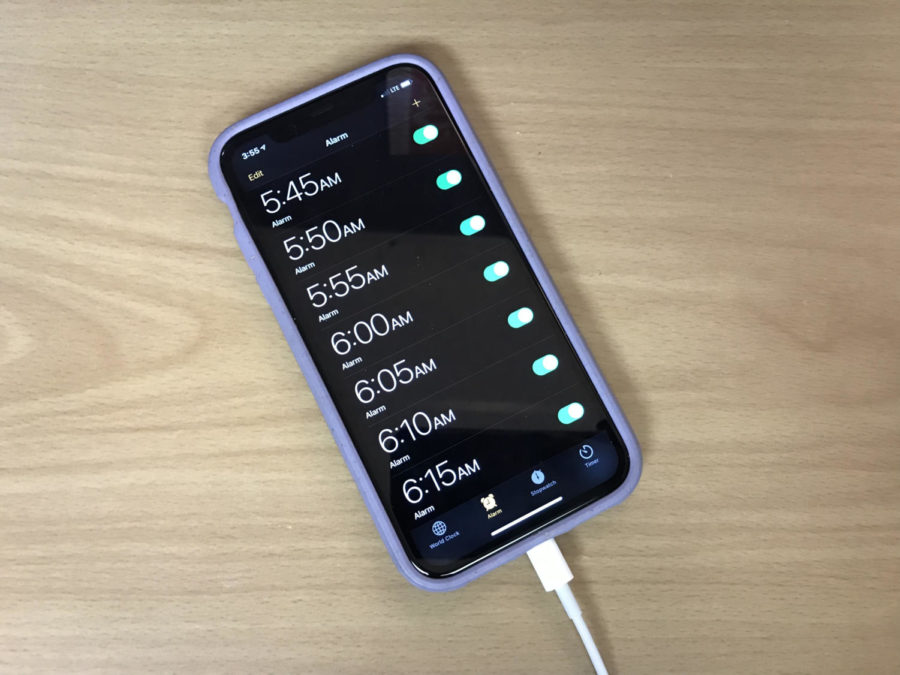Why are Teens not Getting Enough Sleep?
A student’s phone shows all of their alarms turned on for school early in the morning. With school starting at 7:40 AM, many students need to wake up between 6:00 and 7:00 AM. “I wake up at 6:30 every morning to come to school on time,” said Melissa Burgher ‘22.
March 16, 2022
Wake up, go to school, go to work, finish homework, go to bed, repeat. This seems to be what life looks like for many high school students today. Add in extracurricular activities, sports practices and games, or any personal time, and it seems like there are simply not enough hours in the day for teens to handle everything while getting enough sleep at night. It has been well discussed, especially in recent years, that teens do not receive enough sleep every night, but more importantly, are the reasons as to why, and what can be done to help.
It’s important to understand what ideal sleep looks like for a teenager. Johns Hopkins Medicine says that there is a natural shift in circadian rhythm during teen years, making it more difficult for adolescents to fall asleep before 11 PM. The fact that it is now difficult for teens to even fall asleep at an early time, paired with the fact that they typically need to wake up early for school, makes it clear as to why sleep deprivation is so common among teenagers. The amount of sleep required for teenagers who are going through a second developmental stage of cognitive maturation is nine to nine and a half hours per night. That’s more sleep than they needed at age ten, and more than they will need as an adult. When teens get this much sleep, it not only facilitates cognitive and physical development, but also helps to prevent depression and drug use, according to Johns Hopkins Medicine.
Getting nine and a half hours of sleep every night sounds like a great idea in theory, but in practice, may not be realistic for many teens. Emma Hutchinson ‘22 says that on average, she gets around four hours of sleep each night. That is less than half of the recommended amount for teens. Hutchinson cites too much homework as a contributing factor to her disturbed sleep schedule, sometimes having to pull “all-nighters” to finish all of her work. Melissa Burgher ‘22 agrees that school can cause teens to have a difficult time trying to get enough sleep. “I think that school work definitely contributes to teens not getting enough sleep. I also feel that stress from school can contribute to lack of sleep–I can’t sleep if I’m thinking about what I have to do in school or in one of my classes,” said Burgher.
Pair the stress of school work that many students experience with early start times, and a natural shift in circadian rhythm, and it can be very difficult for teenagers to get the proper sleep that they need in order to grow and develop. Both Hutchinson and Burgher say that they do not think they get enough sleep every night, and are often tired throughout the day. So what does all of this mean for teenagers across the country, and what can we do to help this problem?
Hutchinson suggests that “teens should be assigned little to no homework or they should be given more time to do homework while at school.” This would help to provide teenagers with more free time outside of school, and less time spent doing homework, or feeling stressed about school when they should be sleeping. Another way to allow teenagers more sleep is to push back the school start time so that they can sleep in for a little bit longer. Teens can also work on improving their time-management to avoid needing to spend more time on homework than is necessary. It’s difficult for the people present in teens’ lives to always make these changes, or do what they can to help teens get more sleep, but it is important for them to keep the health and well-being of these teenagers in mind–as is for the teenagers to do what they can to help themselves get the amount of sleep that they need, every night.













